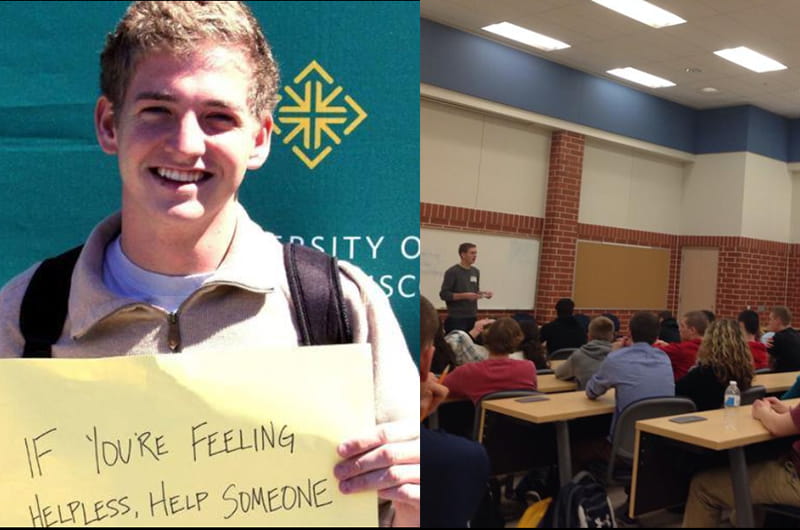Four years after suicide attempt, Drexel student works to erase mental-health stigma

- ‘Too Much Going On’: Autistic Adults Overwhelmed by Nonverbal Social Cues
- Drexel’s College of Nursing and Health Professions Receives $1 Million for Scholarships from the Bedford Falls Foundation – DAF to Address Nursing Workforce Shortage
- Laura Turner to Join Drexel University as Senior Vice President for Institutional Advancement
- When the World Changes, Drexel Changes With It

Drew Bergman knows that you’re wearing an invisible backpack right now. And so is the person next to you or across from you, and so are your friends and family.
“We carry this invisible backpack with us everywhere, but no one can see it. We cram our family pressures and our school pressures and relationships into this bag, and the bag gets heavier and heavier,” said Bergman, a sophomore marketing student in the LeBow College of Business. “And if you feel like you can’t carry it, then you should find help and find positive coping mechanisms. And if you know someone who’s having trouble carrying it, then find them help or positive coping mechanisms. You have no idea what someone’s carrying in their invisible backpack.”
It’s the last part of a 45-minute speech that he’s given to thousands of students in just this past academic year. As a volunteer speaker with Minding Your Mind, a nonprofit organization dedicated to erasing the stigma associated with mental health issues, Bergman educates local high school students about mental ailments by using his own story as a launching pad. This leads to discussions about positive coping methods and the importance of speaking out in dark times.
Just two years ago, Bergman was also a high school student. Just three years ago, he spoke about depression and his experience in front of his peers and friends at his high school. And just four years ago, he tried to commit suicide for the second time.
“I was really suffering and it was a battle. I talk about how difficult it was every day.
I had a 3.7 GPA during my junior year of high school and a 4.0 during my senior year. I went to 10 proms and homecomings. I was the popular kid but there was a side to me that kids didn’t know,” he said. “And I felt like I was being inauthentic if I didn’t tell them who I was, and I wanted them to know. I wanted to speak for the voices that can no longer be heard, whether it was because their suicide attempts were completed or if they themselves didn’t feel comfortable enough about their struggles.”
Bergman has been speaking up since he first became involved with Minding Your Mind in high school. After he transferred to Drexel during his sophomore year, he started speaking in auditoriums, health classes and community groups regularly. He came at the right time: The organization visited 150 schools in the tri-state area in 2012 and has already spoken at 550 schools in 2014. All of the speakers are young, which makes it easier for teens to relate to their speakers.
“Kids would rather listen to someone who’s 20 years old than someone who’s 40 years old and is telling them when you get older, when you get married, when you have kids, it gets better. I’m 20 years old and I’m telling them it gets better two years down the road,” he said.
Providing support and outreach for depression and mental health is important because suicide is the second-leading cause of death for college students. After several recent suicides by local college students, many schools have increased their outreach systems. President John Fry formed a suicide-prevention task force after the suicides of two students last year.
“You would never think that it would be a kid like me,” Bergman said. “You’d never think it’d be a girl like Madison Holleran [a University of Pennsylvania track star who committed suicide in January]. We never think that it’s going to be the track star. I stand up in front of my kids and it’s from the bottom of my heart. It can be anyone. Mental illness can really affect anyone.”
Bergman teamed with adjunct instructor Christopher Burrell and his students in a “ Marketing for Non-Profit Organizations” course this past winter term to expand his reach by increasing his social media presence. Burrell is a friend of Bergman and attended college with Bergman’s brother; he was inspired him to give his students the task of creating social media pages for Bergman and possibly Minding Your Mind as a final project.
Bergman talked to the students about his experiences and involvement, and he also brought in someone involved with Minding Your Mind’s social media pages to give additional insight. At the end of the term, the class gave a presentation of its work to the directors of the organization at a reception. The response was overwhelmingly positive: Students in the class were invited to continue working with the organization after the course ended.
Bergman will continue to speak with kids on- and off stage, including answering questions he asks students to write on notecards. He hopes to provide support for young adults in the future as a guidance counselor.
In This Article
Drexel News is produced by
University Marketing and Communications.
